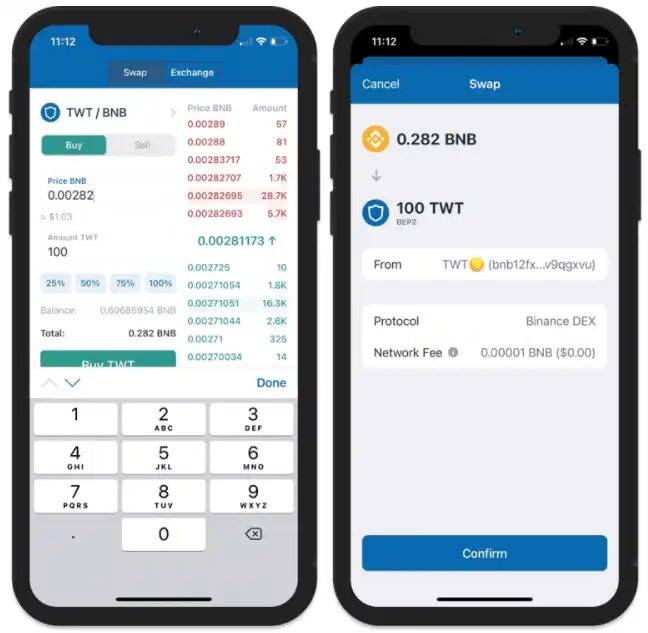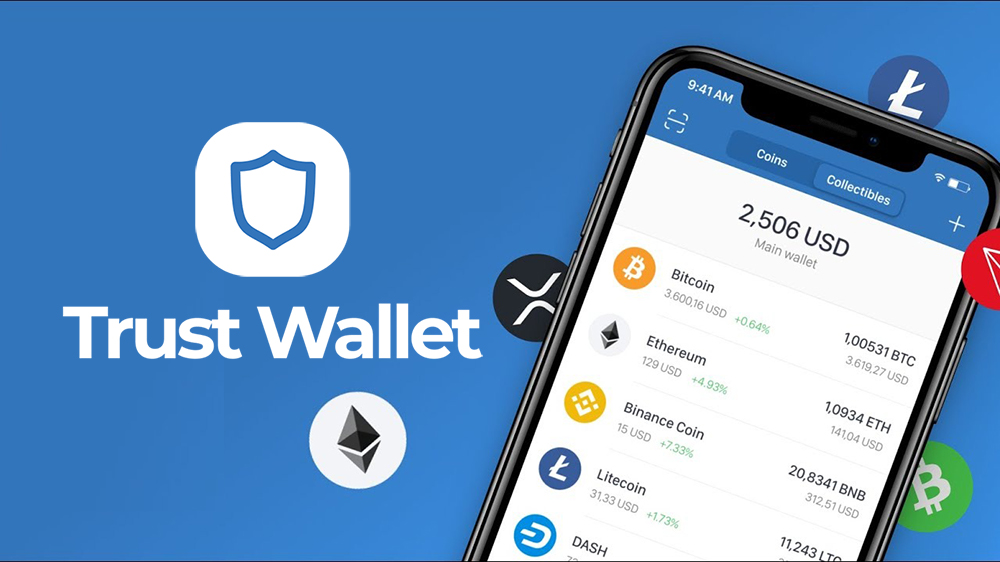Trust Wallet itself does not charge any fees for downloading or using the wallet. However, users must pay network fees for blockchain transactions, such as sending or swapping cryptocurrencies, which go directly to the network, not Trust Wallet.

Understanding Trust Wallet’s Fee Structure
Trust Wallet’s approach to fees is integral to its function as a non-custodial wallet, offering users control over their cryptocurrencies. Here’s a breakdown of how fees work within Trust Wallet and how they compare to other platforms.
The Basics of Trust Wallet Fees
Trust Wallet itself does not charge any fees for downloading or using the wallet. However, users incur network fees when conducting transactions, such as sending cryptocurrencies, swapping tokens, or interacting with smart contracts. These fees go directly to the miners or validators of the blockchain network, not to Trust Wallet.
Comparison with Other Wallets and Exchanges
When compared to other wallets and exchanges, Trust Wallet’s main difference lies in its non-custodial nature. While exchanges may charge additional fees for services like trading or withdrawing funds, Trust Wallet transactions only involve the network fees required by the blockchain. This often makes Trust Wallet a more cost-effective option for users who are looking to hold and manage their cryptocurrencies directly.
How Trust Wallet Manages Blockchain Fees
Trust Wallet automatically calculates the network fee based on the current congestion of the blockchain network to ensure that transactions are confirmed in a timely manner. Users have the option to adjust these fees in some cases, allowing for flexibility between transaction speed and cost. Trust Wallet’s role is to provide an interface that facilitates these transactions with transparency about the fees involved.
Understanding these aspects of Trust Wallet’s fee structure can help users navigate their cryptocurrency transactions more effectively, ensuring they can make informed decisions about their digital asset management.
Transaction Fees on Trust Wallet
How Transaction Fees are Determined
Transaction fees within Trust Wallet are influenced by several key factors, directly tied to the operations of the underlying blockchain network. These factors include:
- Transaction Complexity: The more complex a transaction is (e.g., interacting with smart contracts, executing multi-token swaps), the more computational resources it requires, leading to higher fees.
- Network Demand: Fees can vary significantly with the demand for block space. Higher demand means higher fees, as users compete to have their transactions processed promptly.
- Blockchain-Specific Attributes: Each blockchain has its own fee structure. For instance, Ethereum calculates fees based on gas prices and gas limits, while Bitcoin fees are influenced by transaction size in bytes.

The Role of Network Congestion in Fees
Network congestion plays a crucial role in determining transaction fees:
- Peak Times: During periods of high transaction volume, such as significant market movements or popular token launches, the demand for transaction processing increases. This demand leads to higher fees as users bid to prioritize their transactions.
- Impact on Fees: The blockchain operates on a bidding system for transaction processing. When the network is congested, users must pay higher fees to incentivize miners or validators to include their transactions in the next block.
Tips for Minimizing Transaction Fees
Minimizing transaction fees requires strategic planning and a good understanding of the blockchain network:
- Timing Transactions: Plan your transactions during off-peak hours when the network is less congested. Transaction fees tend to be lower when there’s less demand for block space.
- Adjusting Fees Manually: Some blockchains and wallets, including Trust Wallet for certain networks, allow users to adjust the fee they’re willing to pay. Opting for a lower fee is suitable for non-urgent transactions, though it may result in slower processing times.
- Utilizing Layer 2 Solutions: For networks like Ethereum, consider using layer 2 solutions or sidechains that offer lower transaction fees. Trust Wallet supports some of these solutions, allowing for cheaper and faster transactions.
Swapping and Trading Fees in Trust Wallet
Fees for Swapping Cryptocurrencies Within the App
Swapping cryptocurrencies within Trust Wallet involves two main types of fees: network fees and, potentially, a liquidity provider fee. Network fees are necessary for processing the transaction on the blockchain and vary depending on the network’s congestion and the specific cryptocurrencies involved. Some swaps might also involve a liquidity provider fee, which goes to the liquidity pools facilitating the swap. This fee can vary based on the decentralized exchange (DEX) protocols Trust Wallet interacts with for the swap.
Comparing Swapping Fees: Trust Wallet vs. Exchanges
- Trust Wallet: Swapping in Trust Wallet typically offers direct access to decentralized exchange services, meaning fees can often be lower than centralized platforms, especially for less common trading pairs. Since Trust Wallet facilitates swaps directly on the blockchain, users only pay network and liquidity provider fees without additional charges from the wallet itself.
- Centralized Exchanges: Centralized platforms might charge a flat trading fee, maker/taker fees, and sometimes withdrawal fees to move your assets out of the exchange. While they can offer lower network fees through internal balancing, the cumulative costs can sometimes exceed those of DEX transactions, especially for smaller amounts.
How to Reduce Costs When Trading on Trust Wallet
- Choose the Right Time: Engage in swaps during times of lower network congestion to benefit from lower network fees. Late nights and weekends can sometimes offer these conditions.
- Select the Most Efficient Networks: Some cryptocurrencies operate on multiple networks. Choosing a network with lower transaction fees for your swaps can significantly reduce costs.
- Use DEX Aggregators: Trust Wallet often integrates DEX aggregators that find the best swap rates across multiple liquidity pools. This not only ensures a better swap rate but can also minimize liquidity provider fees by selecting the most efficient route for your trade.
Gas Fees Explained
What Are Gas Fees and How Do They Work?
Gas fees are payments made by users to compensate for the computational energy required to process and validate transactions on a blockchain network, notably on Ethereum. These fees are not fixed and depend on several factors, including the complexity of the transaction and the current demand on the network. In essence, gas fees are the “fuel” that powers transactions, with the fee amount fluctuating based on how busy the network is and how quickly a user wants their transaction processed.
The Impact of Ethereum Gas Fees on Transactions
Ethereum gas fees can significantly affect the cost of transactions on the network, especially during times of high congestion. When many users are trying to conduct transactions simultaneously, the demand for network space increases, driving up gas prices. This can make executing smart contracts or trading tokens particularly expensive during peak periods, affecting the overall affordability and accessibility of Ethereum-based applications and services.

Strategies to Save on Gas Fees Within Trust Wallet
- Transact During Off-Peak Hours: Gas fees tend to be lower when the network is less congested, often during late night or early morning hours (in UTC time). Monitoring gas fee trends can help you choose the most cost-effective times to transact.
- Adjust Gas Price and Limit: Some transactions allow you to manually adjust the gas price and limit. Lowering these can reduce fees, but may also slow down transaction processing times.
- Utilize Layer 2 Solutions: Many Ethereum-based layer 2 solutions offer reduced gas fees by processing transactions off the main Ethereum blockchain. Trust Wallet supports transactions on some of these networks, enabling users to save on gas fees while still interacting with Ethereum’s ecosystem.
- Batch Transactions: When possible, batching multiple transactions into one can save on gas fees compared to executing them individually. This is particularly relevant for DeFi users who may perform several actions in one session.
By understanding and implementing these strategies, Trust Wallet users can navigate the complexities of gas fees more effectively, optimizing their transactions for both cost and speed.
